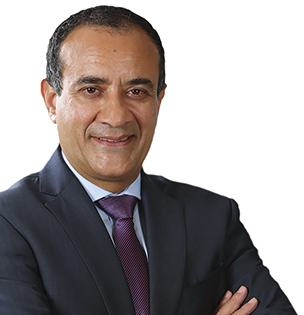Q: Commercial Bank has seen profits drop in recent years as the whole Qatari banking sector has faced a more restrictive landscape. How are you combating this?
A: I joined Commercial Bank last June, and the first thing we did was put together a five-year strategic reshape plan. On all those measures, Commercial Bank is doing well – in fact, we are ahead of the timelines. We successfully executed a rights issue for QR1.5bn [$412m] in January to strengthen our core equity Tier 1 capital from 10% to 11.4%. We are cleaning up our legacy loan book and we have taken a significant number of provisions, which we aim to finish by the end of 2017. Our cost-to-income ratio was 45%, well above the market average of 30%. We have brought that down to 38% already and by the end of the year, I’m hoping we will further improve on that figure.
We’ve also launched new digital initiatives, such as remittances to India in 60 seconds. This has been very successful. Qatar has a significant expat population so remittances are an important focus area for Commercial Bank and we plan to expand this digital service to other key countries. Our operating profits before provisioning are actually higher now, increasing 7.8% year on year to QR1.1bn in the first half of 2017. This to me is a true reflection of the underlying business.
Q: Commercial Bank’s non-performing loan ratio increased from 4.8% to 5.6% year on year in the first half of 2017. Is this something to be worried about?
A: When we began provisioning our legacy book this required re-categorising certain loans as non-performing. For me it’s a necessary action, and we’re prepared to take that to make sure our book is adequately provisioned. It is a painful process but to my mind there is no point deferring painful actions. Now we have to make sure the loans we issue going forward don’t end up in the same way.
We’ve made significant changes to reshape the book, moving towards more high-quality government and public sector loans, and re-establishing a tight risk culture to ensure we have much stronger credit origination. As we continue to build up a healthy book, over time this figure will come down. It should give comfort to people that Commercial Bank is being open about taking provisions to ensure that we have a clean book going forward.
Q: In June, the United Arab Emirates, Saudi Arabia, Bahrain and Egypt cut ties with Qatar, accusing the country of supporting extremist groups. How much of an impact has that had on the Qatari banking sector?
A: With this latest situation, the first impact was deposits from the blockading countries being withdrawn. About 5% of the banking sector deposit base was these kinds of deposits, and over the past few months those have gone away.
However, about 20% of the deposit base is from international sources, many from Asia, and that hasn’t been impacted very much. A lot of Asian investors are unfazed. If you speak to South Korean banks they put it in the context of their own crisis with North Korea on their doorstep; China and Taiwan also have their own individual comparison points and so the Gulf Co-operation Council economic blockade hasn’t concerned them.
At the end of the day, Qatar is an AA rated country providing attractive yields. The Qatari banking sector has adjusted to the change and the Qatari economy has proved to be resilient. We have now adjusted to the situation where we don’t have those deposits, so the system is in equilibrium.
Q: Commercial Bank recently launched the first blockchain pilot in Qatar. How key to you is pushing ahead with new technology?
A: The whole world is doing digital. Digital is increasing exponentially in banking, while the number of branches is remaining fairly static. Consumers are moving towards that, so it is critical for banks to innovate and use technology. As the world goes digital, your margins are going to come down, so if you are going to survive in that world you have to make sure your ability to service transactions at a lower and lower price point is still feasible.
The only way to do that is through internally digitalising the organisation. The blockchain pilot was to test our own technology and our capability to deploy it. Personally, I think remittances are the first place that you can use new technology, especially in a place such as Qatar where a significant proportion of the population is expatriate. Remittances are an important service for our clients.












